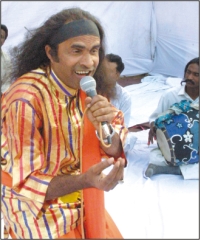In conversation with Abdul Kuddus Boyati
A lifelong commitment to 'palagaan'
Ershad Kamol
ORIGINATING in the greater Mymensingh region, palagaan or narrative folk ballad, is usually based on the stories of the puranas and folktales. A palagaan has an introduction and a prologue in praise of a legend. Its narration in prose is brief and the rest consists of metaphysical discourses, shlokas and songs. Vivid descriptions and realistic portrayals of characters are special features of these palagaan, which use dialect and folk melody. Many of the popular palagaan have been included in Moimensingha Geetika and Purbabanga Geetika. Abdul Kuddus Boyati is a leading palakar (narrator in palagaan folk genre) in the country. He has composed over 80 palas based on legends such as Holek Badshah, Kanchan Badshah, Feroz Khan Dewan, Mahua, Malua, Kamola Rani, Dewan Madina, Rupaboti, Bhelua and Mehernegar. Kuddus Boyati has become an icon of the folk genre amongst the urban dwellers in Bangladesh for his unique presentation of the palas. During the presentation of a pala, not only his stentorian voice modulation, but also his spontaneous acting of the legendary characters moves the audience. Using normal props such as small doll, sari, pillow, whip, wooden sword and more he can perform 20 characters simultaneously in a pala. And his smooth transformation from narration to several characters is an example of the rich indigenous performing art forms of Bangladesh. Kuddus had to struggle to succeed like many other folk artistes. To quote him, "I was born in an impoverished family. Since childhood I was fascinated by palagaan. I began to learn pala from my uncle Mansur Ali, a blind rural bard with a melodious voice. However, my father was against my taking up music as he had lost his property doing jatrapala. To earn bread and butter for my family I had to sell nuts and betel leaf at bazaars. Late at night when everyone was fast asleep, I would leave the house and participate at the palagaan performed by my mentor Mansur Ali. This way, I continued as his dohar (supporting vocal in a pala who introduces a new topic) for over three years. "A turning point in my life was the performance of Holek Badshah Pala, while my mentor took a brief rest and requested me to continue. It was a sad sequence, and I gave a soulful performance. My mentor blessed me and advised me to continue my career individually. Initially, I used to get Taka 9 for singing the whole night. At that stage of my career, I used to perform over 30 shows a month. Then I gradually developed my own style: acting out the characters of the pala during presentation" In November 1988, Kuddus performed at Mahila Samity Stage, Dhaka. His performance not only attracted the audience, it gave new ideas to the urban theatre practitioners. To quote him, "Seeing the performance of Indian artiste Padmasree Teejan Bai, who stages Mahabharat in narrative and enacts different legendary characters, theatre personalities looked for similar artistes in Bangladesh. Then Saidur Rahman, a Bangla Academy employee, came to Kendua, Netrokona looking for me. He requested me to perform a pala at Mahila Samity Stage. I performed Feroz Khan Dewan and Moriom Bibir Pala, based on a true story of Jangalbari, Kishoreganj. "My performance, especially the handling of narrative and smooth transformation of the characters, impressed the theatre personalities. Selim Al Deen, the then chairperson of Department of Drama and Dramatics took me to Jahangirnagar University to conduct a workshop on narrative for the university students. Subsequently, I conducted several workshops for the theatre activists in Dhaka" From then onwards he never looked back. He performed at the silver jubilee celebration of BTV and several other TV programmes. His performance of the Unicef commercial Ei Din Din Noy Aro Din Achhe gave Abdul Kuddus Boyati wide popularity. To quote him, "Director Humayun Ahmed gave me this opportunity. I'm not an educated person, I can't even write a word, but in the commercial I lead the children to school, which was to introduce the universal primary education in Bangladesh in 1992." Kuddus thinks that our rich traditional palagaan genre is now in a precarious condition. "Like me most of the rural bards are illiterate. It's the time to preserve the presentation of the traditional palagaan, otherwise the oral tradition of folk genre will be lost for ever," said Kuddus. Besides, performing palagaan, Kuddus also renders other folk songs. He has staged shows in USA, UK and India.
|

Abdul Kuddus Boyati delivering a charged performance |